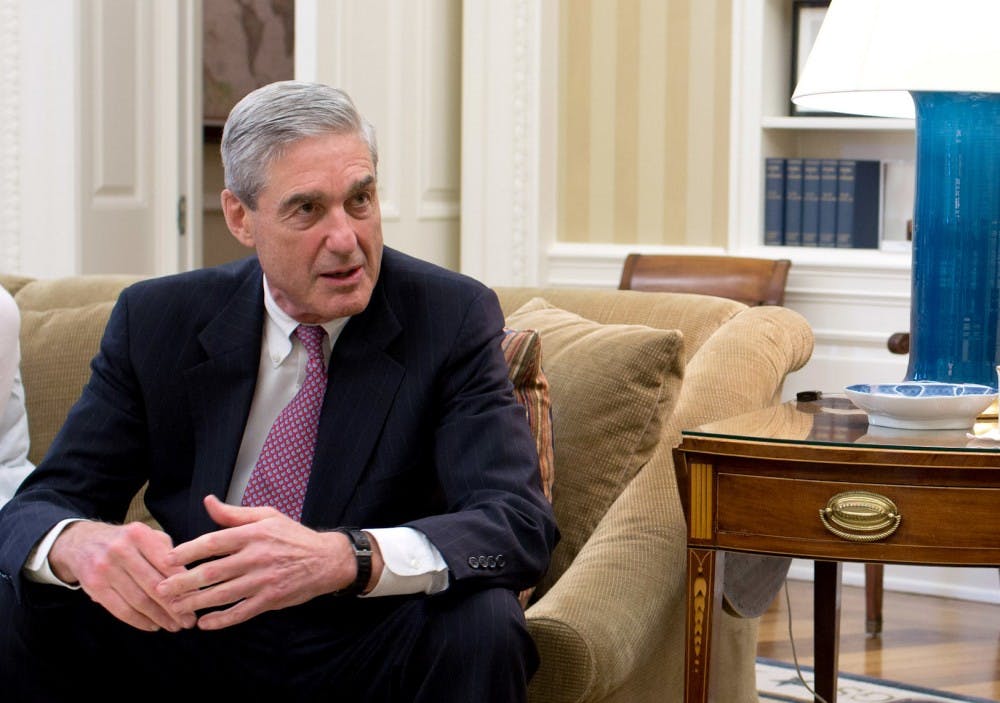On April 18, the Justice Department released the long-awaited report of Special Counsel Robert Mueller ’66 to Congress and the American public.
I believe the Mueller report is the document that the United States needs right now. It presents all Americans — regardless of party affiliation or political stance — with a chance to consider the facts and assess the truth without spin or commentary. Attorney General William Barr claimed that one out of every eight lines were redacted because of potential harm to ongoing matters, personal privacy, investigative techniques, or grand jury materials.
Despite such redactions, the Mueller report is a substantial document. Many have criticized the Special Counsel’s report for rejecting the claims of collusion between the Trump campaign and Russia while simultaneously failing to make a prosecutorial judgment on the question of obstruction of justice. In this vein, the report has garnered a somewhat negative light in the media for not making a definitive judgement on whether the President obstructed justice.
I won’t summarize the 448 pages of the report in this piece; rather, I will leave that experience for the reader. However, I will add that the report’s language is distinctly objective and descriptive. Mueller and the Special Counsel’s team made no attempt to politicize the subject of the report for ulterior motives. Instead, Mueller crafted a piece of writing that outlined the facts, presented the complete truth, and issued a level of transparency uncharacteristic for the state of American politics today.
We live in a society devoid of a fundamental public record of fact and unquestioned truth. Our news media — regardless of which channel or which publication you subscribe to — more often than not delivers a commentary of the news. We watch pundits on television break down the facts for us; we imbibe the reality around us through the mouthpieces of corporate media conglomerates and news companies. This type of approach to public information and transparency limits the critical thinking that each individual must perform. Rather than think and judge the facts before us for ourselves, we rely on others to dissect the truth and present it to us in bite-size, palatable bits.
In this vein, the Mueller report is knowledge and fact in its purest form. It makes no claim to commentate, adjudicate, or present the version of truth we as Americans should accept. Its contents represent the fundamental bedrock of any sound democracy: transparency and truth.
What the Mueller report inspires all Americans to do is engage with our shared democracy rather than hide behind the interpretations of others. The report seeks a different, uncharacteristic path for our times; it demands each reader digest its contents, think critically about what these truths mean for our President and our nation, and ultimately develop a stance on what its transparent truths mean in the path ahead. Did the President commit obstruction of justice? Readers must come to that conclusion on their own, independently, and only after a careful meditation on what the Mueller report details.
You will not find commentary in the Mueller report similar to what MSNBC, Fox News, or CNN are saying about the report itself. It merely gives us Americans something we rarely get to experience in politics: the full truth about what goes on in the throes of power in our nation. The path ahead is a democratic one — one that depends upon our form of government to represent the public it is supposed to dutifully serve.

The most obvious product of this democratic path would be the impeachment of Donald Trump. Once the American public and members of Congress have the chance to digest the full weight of the truth in the Mueller report, the decision then lies with these channels of our republic to decide whether or not the President committed impeachable offenses.
Critics of my argument will likely contend that my perspective is quite an idealistic one. In realist terms, the Mueller report failed to make a clear decision, and now it has potentially allowed political, partisan actors to leave deep marks on the pure facts of what it holds to be true.
But while this reality of our American political system may be true, I believe that the power of individual citizens reading and digesting the core of the Mueller report can overcome partisan attempts to distort its factual basis. When everyday Americans make the choice to read the report and develop their own judgements on the President’s actions, a reckoning force can oppose the tides of partisan politics. The truth will never remain hidden indefinitely, and the American public can bring this truth to the forefront of our collective conscious.
When truth and fact are so under attack and when the highest forms of government elicit such division and disgust among all rungs of American society, it is justifiably a hopeful and idealistic stance to believe that truth, fact, and the belief in individuals to think for themselves can persist. It is an idealistic conception of what this report could mean for our society, but I like to think that former Princeton student and Special Counsel Mueller had the same sort of hope in democracy and the faculties of all Americans to judge the truth in the age of “fake news.” To think beyond the limiting constraints of realism and the harsh realities of politics can serve our democracy well and carry on “in the nation’s service.”

Kaveh Badrei is a junior Wilson School concentrator from Houston, Texas. He can be reached at kbadrei@princeton.edu.








